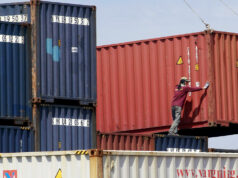E-vehicle sales seen benefiting from excise tax exemption under TRAIN
ELECTRIC VEHICLE (EV) sales this year are expected to maintain their momentum, benefiting from the segment’s exemption from excise taxes, which have dampened the sales of conventionally powered vehicles.
“Things are moving at a faster rate now in our domestic EV industry. One of the biggest developments was when the Tax Reform for Acceleration and Inclusion Law, or TRAIN Law, was passed. Partly due to our representation, electric vehicles were exempted from excise tax,” Rommel T. Juan, president of the Electric Vehicle Association of the Philippines (EVAP), told participants of the 6th Philippine Electric Vehicle Summit in Pasay City.
“Are EVs finally taking off? Without a doubt,” he said.
Mr. Juan said based on a study conducted by consulting firm Frost & Sullivan, global electric car sales in 2017 exceeded the one-million mark, ending the year with 1.2 million units sold. Battery electric vehicles made up the majority of sales.
In 2018, global sales are expected to reach 1.6 million units, with the number of public charging stations forecast at 100,000, he said, citing the study’s estimates.
“There are now 3.3 million electric cars in use around the world. China and Europe together make up about 75% of the global EV market,” he added.
Mr. Juan said he is optimistic that the TRAIN law will pave the way for more affordable EV models and increased investment in support infrastructure that will help sustain the momentum for electric mobility.
He said the Department of Transportation’s Public Utility Vehicle (PUV) Modernization Program that seeks to upgrade about 200,000 jeepneys in the next six years, will have a 10% allocation for electric vehicles.
He said in support of the modernization program, the Department of Trade and Industry and the Board of Investments are putting in place an Eco-PUV program to provide incentives to both EV platform suppliers and body builders. Several banks have also made available financing for the modern PUV.
He also said that the Technical Education and Skills Development Authority (TESDA) is working on a technical regulation that will allow it to offer EV maintenance, servicing and repairs in all its learning centers. He said the move will help facilitate EV sales outside Metro Manila.
“Even our membership bench has deepened as we now have 57 active members, a majority of whom are involved in local production, assembly, supply and distribution of electric vehicles and parts,” Mr. Juan said.
Mr. Juan said the two-day event at the SMX Convention Center, Mall of Asia Complex is intended to solidify partnerships, align objectives, and take collective action to facilitate further adoption of electric vehicles in the Philippines. — Victor V. Saulon



